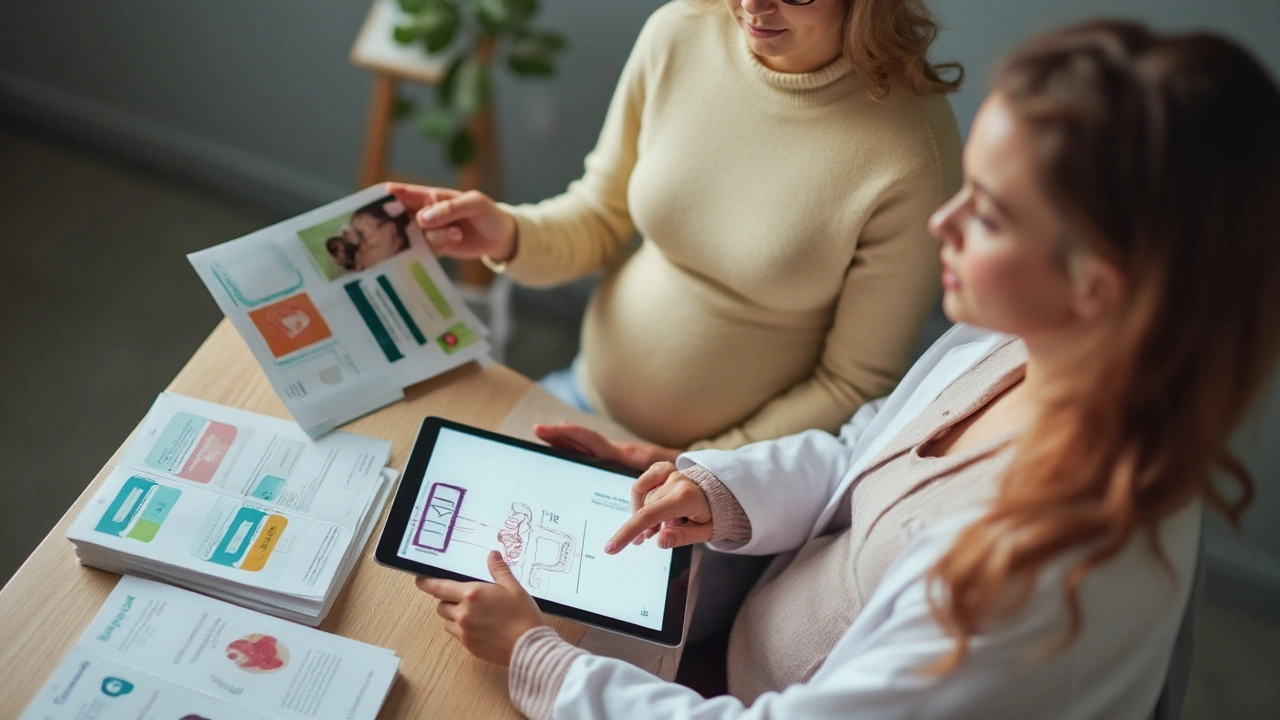Pregnancy is an incredible journey, bringing with it a mix of excitement, anticipation, and a few challenges. As the body goes through numerous changes, some unexpected health concerns may arise. One such concern that isn't often discussed, yet is important to be aware of, is diverticulitis.
For those who aren’t familiar, diverticulitis is a condition that affects the colon, and while it's uncommon in younger people, it can still occur during pregnancy. This can be a daunting prospect for expectant mothers, but with the right information, it’s a challenge that can be managed effectively.
Understanding what diverticulitis is, recognizing the symptoms early on, and knowing how to manage it during pregnancy are essential steps for ensuring both the mother's and baby's health are safeguarded. This guide aims to shed light on what you need to know about diverticulitis during pregnancy, helping you to steer clear of unnecessary risks and enjoy a healthy pregnancy journey.
- What is Diverticulitis?
- Risks of Diverticulitis During Pregnancy
- Symptoms and Diagnosis
- Precautions and Management Strategies
What is Diverticulitis?
Diverticulitis is an ailment linked to the large intestine, or colon, which primarily involves the inflammation of one or more diverticula. But what exactly are these diverticula? They are small bulging pouches that can form in the lining of the digestive system, generally found in the colon. For many individuals, these pouches aren't initially harmful. In fact, such formations are common with age, particularly past 40, and can exist without ever presenting a problem, a condition known as diverticulosis. However, when these pouches become inflamed or get infected, it results in diverticulitis.
The exact cause of diverticulitis is still a topic of research, but prevailing thoughts suggest that a low-fiber diet might play a part. Without enough fiber, stool becomes hard, exerting pressure on the colon walls, leading to the development of these pouches. Apart from dietary factors, a sedentary lifestyle and obesity, along with certain medications like steroids and anti-inflammatory drugs, have been noted to increase the risk. It's curious, isn't it? How seemingly innocuous lifestyle choices may stack the odds against our digestive health.
According to the National Institute of Diabetes and Digestive and Kidney Diseases, "approximately 35% of adults aged 50 and older have diverticulosis, which increases in frequency with age."
When it comes to diverticulitis, symptoms can range from mild discomfort to severe pain. Most commonly, individuals experience lower abdominal pain, typically on the left side. Accompanying symptoms include fever, nausea, a change in bowel habits, or even bloating. It's an unpredictable condition and can strike with little warning, causing distress and discomfort. Thankfully, awareness and timely medical intervention often result in effective management of the condition.
While diverticulitis is not entirely preventable, adopting a diet rich in fiber and maintaining a healthy weight are commonly recommended strategies to lower risk. Foods like fruits, vegetables, beans, and whole grains are excellent sources of dietary fiber and are quite easy to incorporate into daily meals. However, it's essential to increase fiber intake gradually, ensuring the body can adapt without adverse side effects. Some may find it surprising how drastically this can improve digestive health and enhance overall well-being over time.
Interestingly, not all healthcare providers agree about the best preventative measures or treatments for diverticulitis. It's often advised to consult with a specialist or a nutritionist for personalized advice, especially during sensitive periods such as pregnancy. As with many health conditions, individual guidance can prove invaluable. Just remember, understanding your body and its needs is perhaps the best step you can take toward safeguarding your digestive health.

Risks of Diverticulitis During Pregnancy
Expectant mothers understandably focus on creating a nurturing environment for their developing baby, yet certain medical conditions such as diverticulitis can pose unique challenges during this critical time. Diverticulitis, characterized by inflammation or infection of small pouches called diverticula in the digestive tract, may be rare during pregnancy, but awareness of its potential risks is crucial. Hormonal changes and shifts in the digestive system during pregnancy might exacerbate the condition, leading to discomfort and possible complications.
Diverticulitis during pregnancy can sometimes result in more severe symptoms because the pain and tenderness in the lower abdomen might be confused with pregnancy-related changes, delaying diagnosis and increasing the likelihood of complications. As pregnant women are not typically the primary group affected by this condition, medical professionals may initially overlook diverticulitis unless they maintain a high index of suspicion. The risk of untreated diverticulitis is that it might lead to more severe problems such as abscess formation, bowel obstruction, or even perforation, requiring advanced medical intervention.
Pregnancy already places extra demand on the body, and diverticulitis can increase stress levels, both physically and emotionally. The associated inflammation can affect the absorption of nutrients, potentially impacting maternal nutrition and fetal growth. There is evidence suggesting that stress hormones can further aggravate digestive issues, making the condition more challenging to manage. Pregnancy health takes on added complexity when conditions like diverticulitis enter the picture, necessitating extra vigilance from both the woman and her healthcare provider.
Dr. Maria Lopez, an expert in prenatal care, notes, "It's crucial for healthcare providers to listen carefully to expectant mothers and consider unusual symptoms that go beyond common pregnancy complaints. Early recognition and treatment of diverticulitis can significantly reduce risks for both mother and child."
A common concern is the limited treatment options due to the need to avoid many medications during pregnancy because of potential harm to the developing fetus. Pregnant women need tailored treatment plans that prioritize both maternal and fetal safety. This typically involves dietary modifications, increased fluid intake, and monitored use of antibiotics if absolutely necessary. Notably, surgery is rarely considered unless there is imminent danger, underscoring the value of preventive measures.
Understanding these risks and taking steps to mitigate them can make a substantial difference. Regular prenatal consultations are invaluable for tracking any unusual symptoms or warning signs of digestive issues. Combining the advice of a specialist with a keen awareness of one's own body can empower pregnant women to manage diverticulitis effectively.

Symptoms and Diagnosis
Understanding the symptoms of diverticulitis during pregnancy is crucial for managing the condition effectively. The most common symptom is pain, typically on the lower left side of the abdomen. The intensity of this pain can vary from mild discomfort to severe agony, often accompanied by nausea and a noticeable change in bowel habits. Some might experience diarrhea while others may face constipation. It's easy to mistake these signs for typical pregnancy discomfort, which makes early recognition all the more challenging and critical.
Other indicators to watch out for include fever, chills, and occasionally, a urinary tract infection. The fever is usually low-grade but persistent, hinting at underlying inflammation. Expectant mothers might also feel unusually fatigued, which, when paired with a fluctuating appetite, signals that something is amiss. Blood in stool, though less common, is another warning sign that needs immediate medical attention. Given how these symptoms overlap with other pregnancy-related ailments, accurate diagnosis is essential for preventing complications.
Conventional diagnostic procedures often involve a physical examination and a review of medical history. During pregnancy, however, some standard tests, like a CT scan, are approached with caution due to radiation exposure concerns. Instead, a healthcare provider might opt for a safer choice, like an ultrasound, to visualize the infection. Blood tests are typically performed to look for elevated white blood cells, indicating infection. In certain cases, an MRI could be used as a radiation-free alternative to a CT scan, though availability and cost might limit its use.
Dr. Emily Watson, a renowned obstetrician, notes,
"Recognizing the subtle distinction between normal pregnancy symptoms and those of diverticulitis is a fine art. Prompt, accurate diagnosis allows us to tailor intervention strategies effectively, minimizing risks for mother and baby."Emphasizing the importance of communication, she encourages expectant mothers to convey any health changes or discomfort to their healthcare providers promptly. This proactive approach can significantly enhance the chances of early detection and successful management.
The Role of Diet and Lifestyle
Diet plays a pivotal role in both the onset and management of diverticulitis. Dietary fibers, in particular, are crucial allies in preventing flare-ups. During pregnancy, though, cravings might make sticking to a fiber-rich diet a bit challenging. Medical practitioners commonly recommend consuming whole grains, fruits, and vegetables to maintain a healthy digestive tract. Staying well-hydrated is equally important, as water helps fiber work more efficiently, facilitating smoother bowel movements and reducing the risk of constipation, which can exacerbate diverticulitis symptoms.
A healthy lifestyle extends beyond just diet. Regular, gentle exercise can prove beneficial in promoting overall digestive health and reducing stress, which might otherwise trigger symptoms. Walking, yoga, and swimming are excellent low-impact activities for expecting mothers. Rest and quality sleep should not be overlooked, as they are integral components of maintaining health during this transformative period. Balancing these aspects can significantly contribute to managing diverticulitis during pregnancy without compromising the health of the mother or developing fetus.

Precautions and Management Strategies
When it comes to managing diverticulitis during pregnancy, awareness and proactive care can make a significant difference. The key is a combination of vigilant monitoring, healthy lifestyle choices, and timely medical interventions. Start by cultivating an attentive mindset towards your body's signals. Pregnancy brings various changes, so understanding what’s typical and what isn’t can help catch potential digestive issues early. Consulting with a healthcare provider about any concerning symptoms is always a wise first step.
A balanced diet plays a crucial role in managing diverticulitis. High-fiber foods are often recommended to keep the digestive system in good shape, helping to prevent complications. It's beneficial to include a variety of fruits, vegetables, and whole grains, gradually increasing fiber intake to allow your body to adjust without discomfort. Staying hydrated is equally important, as fluids help maintain regular bowel functions and reduce strain on the colon.
Exercise, tailored to each stage of your pregnancy, provides multiple benefits. It aids in digestion, reduces stress, and keeps the body active. Low-impact activities like walking, swimming, or prenatal yoga can be exceptionally helpful. They not only support physical health but also serve to alleviate some common pregnancy health concerns, including digestive discomforts associated with diverticulitis.
"Maintaining a gentle balance between activity and rest is crucial in both preventing and managing diverticulitis during pregnancy," says Dr. Emily Harper, a renowned gastroenterologist. "Listening to your body's needs can help you avoid unnecessary complications."
If symptoms of diverticulitis arise, such as abdominal pain or changes in bowel habits, acting promptly is vital. Medical professionals may recommend antibiotics or even hospital care in more severe cases. Thus, timely intervention often provides the best outcomes. Regular check-ins with your healthcare provider ensure that any developing issues are addressed swiftly.
While precautionary measures can be powerful, it's essential to remember that every pregnancy is unique. Each body reacts differently, so what works for one person might not be suitable for another. Open communication with healthcare providers about any dietary or physical changes, alongside a personalized care plan, will help navigate these challenges effectively. Below is a typical food plan for promoting digestive health during pregnancy:
| Meal | Food Options |
|---|---|
| Breakfast | Oatmeal with berries and a glass of water |
| Lunch | Whole grain sandwich with lean protein and salad |
| Dinner | Grilled chicken, quinoa, steamed vegetables |
| Snacks | Mixed nuts or yogurt |
Lastly, never underestimate the power of support. Whether it’s from family, friends, or a healthcare team, having a network to rely on can make managing diverticulitis during pregnancy significantly less stressful. In the midst of this transformative journey, remember to be gentle with yourself, and prioritize both your health and peace of mind.


Jeffrey Lee
January 22, 2025 AT 13:47Diverticulitis in pregnancy is rare, but American moms need to watc h out for it.
Ian Parkin
January 24, 2025 AT 21:20It is commendable that you are seeking comprehensive information regarding diverticulitis during gestation. A well‑balanced, fiber‑rich diet, coupled with adequate hydration, constitutes a cornerstone of preventative care. Moreover, maintaining open communication with obstetric providers ensures that any atypical symptom is addressed expeditiously. Collectively, these measures foster both maternal wellbeing and fetal development.
Julia Odom
January 27, 2025 AT 04:54First and foremost, congratulations on taking the initiative to learn about such a nuanced topic during pregnancy. Diverticulitis, while often associated with older adults, can indeed surface in younger individuals, especially when compounded by hormonal and physiological shifts of gestation. The article correctly highlights the central role of dietary fiber, a cornerstone of gastrointestinal health, and its amplified importance when the body is juggling both fetal development and maternal needs. Increasing fiber intake gradually is wise, as an abrupt surge can lead to bloating or gas, which are already common discomforts in pregnancy. Hydration works hand‑in‑hand with fiber, facilitating smoother transit and reducing the risk of constipation-a notorious trigger for diverticular flare‑ups. Equally vital is the emphasis on regular, low‑impact exercise; walking, prenatal yoga, and swimming not only support digestion but also alleviate stress hormones that can exacerbate inflammation. From a clinical perspective, the distinction between typical pregnancy discomfort and early signs of diverticulitis is subtle, which underscores the need for vigilant self‑monitoring and prompt communication with healthcare providers. When fever or persistent left‑lower‑quadrant pain appears, especially alongside changes in bowel habits, it is prudent to seek evaluation without delay. Ultrasound and, when safe and available, MRI serve as valuable diagnostic tools that circumvent the radiation concerns of CT scans, aligning with the article’s recommendations. Should antibiotics become necessary, they must be selected carefully to avoid teratogenic risk, a nuance that obstetricians are well‑versed in navigating. Nutrition counseling can be tailored to individual preferences, ensuring that cravings do not derail the fiber‑rich diet, perhaps by incorporating smoothies, fortified cereals, and legumes in a palatable manner. Moreover, cultivating a supportive network-whether through family, friends, or prenatal groups-can provide emotional ballast during any unexpected health hurdle. The article’s inclusion of a sample meal plan is practical; swapping white bread for whole‑grain alternatives can make a measurable difference in stool bulk. It is also worth noting that certain over‑the‑counter remedies, such as NSAIDs, are generally discouraged in pregnancy due to potential fetal effects, reinforcing the importance of medical guidance. In summary, a proactive approach that blends mindful eating, adequate hydration, gentle movement, and close clinical follow‑up forms the backbone of safe diverticulitis management during pregnancy. By staying informed and engaged, expectant mothers can mitigate risks and focus on the joyous aspects of bringing new life into the world.
Danielle Knox
January 29, 2025 AT 12:27Oh great, another article about something no one expects to have while pregnant. Because obviously everyone’s first thought is about fiber, not diapers. But hey, thanks for the reminder.
Mark Evans
January 31, 2025 AT 20:00I really appreciate how the guide balances medical facts with practical tips. It’s easy to feel overwhelmed during pregnancy, and a clear, step‑by‑step plan can make a huge difference. The emphasis on gradual fiber increase respects the body’s adjustment period, which many people overlook. Hydration is often mentioned in passing, but highlighting its synergy with fiber is spot on. I also like the suggestion to keep low‑impact exercise in the routine, as it helps both digestion and mental health. The reminder that any new or worsening pain deserves prompt medical attention is crucial; early detection can prevent serious complications. Overall, the article offers a compassionate, evidence‑based roadmap that many expectant mothers will find reassuring.
Megan C.
February 1, 2025 AT 23:47While the tone of the piece is supportive, it subtly implies that any pregnant woman who neglects a high‑fiber diet is irresponsible. Such moralizing overlooks the complex realities of cravings, nausea, and limited food access that many face. We should encourage healthy choices without casting judgment on those who struggle.
Greg McKinney
February 4, 2025 AT 07:20Sure, fiber is important, but the article could have mentioned that some women simply can’t tolerate certain high‑fiber foods. Not every recommendation fits every palate.
Dawna Rand
February 5, 2025 AT 11:07Love the positivity here! 🌟 Adding a splash of colorful fruit smoothies can make fiber intake both tasty and fun. Keep up the great work, and don’t forget to celebrate each small victory! 🎉
Effie Chen
February 7, 2025 AT 18:40Interesting read – I’ll definitely share it with my prenatal class. 😊 It’s useful to have a concise checklist for something that can be easily missed.